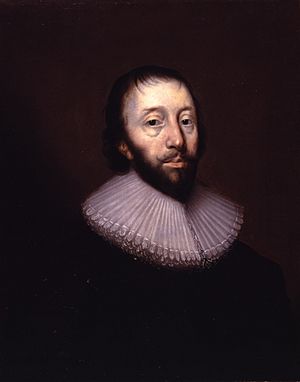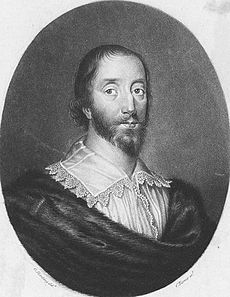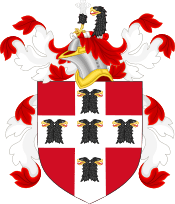Dudley Digges facts for kids
Quick facts for kids
Sir Dudley Digges
|
|
|---|---|
 |
|
| Born | 19 May 1583 |
| Died | 18 March 1639 (aged 55) |
| Spouse(s) | Mary Kempe |
| Children | Edward Digges |
| Parent(s) | Thomas Digges Anne St Leger |
Sir Dudley Digges (born May 19, 1583 – died March 18, 1639) was an important English diplomat and politician. He served in the House of Commons, which is like a part of today's Parliament, from 1610 to 1629.
Sir Dudley was also an "adventurer" for Virginia. This meant he invested his money in the Virginia Company of London. This company helped set up the first English colonies in America. His son, Edward Digges, later became the Governor of Virginia. Sir Dudley Digges also oversaw the rebuilding of Chilham Castle in England around 1616.
Contents
Early Life and Education
Dudley Digges was born in Kent, England. His father was Thomas Digges, a famous mathematician. His mother was Anne St Leger.
Dudley started studying at University College, Oxford when he was 17. He earned his first degree in 1601.
A Career in Politics and Exploration
Becoming a Knight and MP
In 1607, King James I made Dudley Digges a knight. This gave him the title "Sir." In 1610, he was chosen to be a Member of Parliament (MP) for Tewkesbury. An MP represents a local area in the government.
Supporting Explorers
Sir Dudley was a friend of the famous explorer Henry Hudson. In 1610, he helped fund Hudson's last voyage. Because of his support, two places in Canada were named after him: Digges Islands and Cape Digges. These are near the mouth of Hudson Bay.
He also supported the explorations of William Baffin in 1615 and 1616. Sir Dudley and other investors helped pay for these trips.
Building Chilham Castle
In 1616, Sir Dudley finished building his large home, Chilham Castle, in Kent. It was a grand mansion.
Diplomat and Public Service
Sir Dudley became a gentleman of the privy chamber in 1618. This was a position close to the King. He also served as an ambassador for England. He went to Russia in 1618–1619 and to Holland in 1620.
He was re-elected as an MP for Tewkesbury several times. In 1626, he played a big role in trying to remove the Duke of Buckingham from power. This was a very tense time in English politics. Sir Dudley was even put in prison for a short time by the King. However, he was released after he apologized.
In 1628, he became an MP for Kent. He served until 1629, when King Charles I decided to rule without Parliament for eleven years.
Later, Sir Dudley became a lawyer at Gray's Inn in 1631. He also worked as a master in chancery from 1631 to 1637. This was a high legal position.
Helping Virginia
Sir Dudley continued to help the American colonies. In 1631, he joined a group that looked at how the colony of Virginia was doing. They also thought about what goods could be grown there. In 1634, he became a Commissioner for Virginia Tobacco.
In 1638, he was appointed Master of the Rolls. This was a very important legal job. He held this position until he died in 1639.
Published Works
Sir Dudley Digges wrote several books about politics and economics. Some of his works include:
- The Worthiness of Warre and Warriors (1604)
- The Defence of Trade (1615)
- Rights and Privileges of the Subject (1642)
After he died, a very important book called The Compleat Ambassador was published in 1655. This book showed official letters and documents from past diplomatic missions. It was a big step forward in how history was written in England.
Family Life
Sir Dudley Digges married Mary Kempe. They had eight sons and three daughters. Eight of their children lived to be adults.
One of their sons, Edward Digges, moved to America in the 1640s. He became the Governor of Virginia from 1655 to 1656. Edward's grandson, Dudley Digges (born around 1728), also became an important politician in Virginia. He served in the House of Burgesses and was part of the Committee of Safety during the American Revolution.
Another son, Dudley (born around 1612), wrote a book in 1643. It was about why citizens should not take up arms against their rulers.
Sir Dudley Digges left money in his will to his local church. For about 200 years after his death, this money provided a prize for races. These races were held between the men and women of the parish of Chilham, Kent.
Children of Sir Dudley Digges
- Thomas Digges (born 1603)
- Ann Digges (born 1616)
- Elizabeth Digges (born 1617)
- Francis Digges (born 1619)
- Edward Digges (1621–1675)
- Leonard Digges (born 1622)
- Herbert Digges (born 1628)
- Richard Digges (born 1635)
See also
- Diggs baronets
 | Jessica Watkins |
 | Robert Henry Lawrence Jr. |
 | Mae Jemison |
 | Sian Proctor |
 | Guion Bluford |



